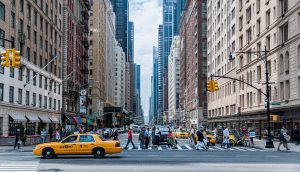


Highly mended reading es from Matt Ridley in the Wall Street Journal. His essay, “The Green Scare Problem,” rebuts environmentalist Cassandras from Rachel Carson to the present day, exposing the rampant hyperbole ecological warriors employ to sell their global warming and anti-genetically modified organism policies to an unsuspecting public. Ridley goes even further to show how these policies harm the world’s poorest.
Ridley begins by quoting President Obama, who reduces the opposition of his climate-change agenda as nothing more than the “same stale arguments.” Ridley’s response is priceless:
The trouble is, we’ve heard his stale argument before, too: that we’re doomed if we don’t do what the environmental pressure groups tell us, and saved if we do. And it has frequently turned out to be really bad advice.
Making dire predictions is what environmental groups do for a living, and it’s petitive market, so they exaggerate. Virtually every environmental threat of the past few decades has been greatly exaggerated at some point. Pesticides were not causing a cancer epidemic, as Rachel Carson claimed in her 1962 book “Silent Spring”; acid rain was not devastating German forests, as the Green Party in that country said in the 1980s; the ozone hole was not making rabbits and salmon blind, as Al Gore warned in the 1990s. Yet taking precautionary action against pesticides, acid rain and ozone thinning proved manageable, so maybe not much harm was done.
However, Ridley notes, ongoing efforts to mitigate climate change pose real and measurable harms to the economy, not least to the poor facing exorbitant jumps in energy costs. For example, Ridley notes, the Environmental Protection Agency’s Clean Air initiative could cost the United States “up to $1 trillion in lost GDP [gross domestic product].” This figure is based on analysis of Energy Information Administration data by Heritage Foundation statistician Kevin Dayaratna. Yes, acknowledges Ridley, the EPA’s efforts would cut power-plant carbon-dioxide emissions by 32 percent from 2005 levels by 2030, but he adds that this would only amount to a 2 percent reduction in global emissions.
Ridley then turns to the left’s bizarre crusade against GMOs:
After 20 years and billions of meals, there is still no evidence that they harm human health, and ample evidence of their environmental and humanitarian benefits. Vitamin-enhanced GM “golden rice” has been ready to save lives for years, but opposed at every step by Greenpeace. Bangladeshi eggplant growers spray their crops with insecticides up to 140 times in a season, risking their own health, because the insect-resistant GMO version of the plant is fiercely opposed by environmentalists. Opposition to GMOs has certainly cost lives.
Besides, what did GMOs replace? Before transgenic crop improvement was invented, the main way to breed new varieties was “mutation breeding”: to scramble a plant’s DNA randomly, using gamma rays or chemical mutagens, in the hope that some of the monsters thus produced would have better yields or novel characteristics. Golden Promise barley, for example, a favorite of organic brewers, was produced this way. This method still faces no special regulation, whereas precise transfer of single well known genes, which could not possibly be less safe, does.
Environmentalists are currently opposing neonicotinoid pesticides on the grounds that they may hurt bee populations, even though the European Union notes that honeybee numbers have been rising in the 20 years since they were introduced. The effect in Europe has been to cause farmers to return to much more harmful pyrethroid insecticides, which are sprayed on crops instead of used as seed dressing, hitting innocent bystander insects. And if Europeans had been allowed to grow GMOs, then less pesticide would be necessary. Again, green precaution increases risks.
Ridley reveals the absurd arguments progressives wage against nuclear power and hydraulic fracturing (fracking) for natural gas. He references a National Aeronautic and Space Administration study, concluding nuclear power is safer than even wind and solar, and has prevented 1.84 million deaths more than it caused. As to fracking, Ridley reports:
Likewise widespread opposition to fracking for shale gas, is based almost entirely on myths and lies, as Reason magazine’s science correspondent, Ronald Bailey, has reported. This opposition has substantially delayed the growth of onshore gas production in Europe and in parts of the U.S. That has meant more reliance on offshore gas, Russian gas, and coal—all of which have greater safety issues and environmental risks. Opposition to fracking has hurt the environment.
In short, the environmental movement has repeatedly denied people access to safer technologies and forced them to rely on dirtier, riskier or more harmful ones. It is adept at exploiting people’s suspicion of anything new.
Remember all the dire warnings related to climate change that have only recently been removed from progressive talking points? If not, Ridley reminds us:
Many exaggerated early claims about the dangers of climate change have now been debunked. The Intergovernmental Panel on Climate Change has explicitly abandoned previous claims that malaria will likely get worse, that the Gulf Stream will stop flowing, the Greenland or West Antarctic Ice sheet will disintegrate, a sudden methane release from the Arctic is likely, the monsoon will collapse or long-term droughts will e more likely.
Despite the feel-good, warm fuzzies solar and wind energies generate for the progressive champions of renewable mandates, Ridley states they only provided “1.35% of world energy in 2014, cutting emissions by even less than that,” before identifying the real culprit threatening human life:
Indoor air pollution, caused mainly by cooking over wood fires indoors, is the world’s biggest cause of environmental death. It kills an estimated four million people every year, as noted by the nonprofit science news website, SciDev.Net. Getting fossil-fueled electricity and gas to them is the cheapest and quickest way to save their lives. To argue that the increasingly small risk of dangerous climate change many decades hence is something they should be more worried about is positively obscene.
Agreed. One can only hope someone slips Pope Francis Mr. Ridley’s essay before he speaks to Congress in October.









